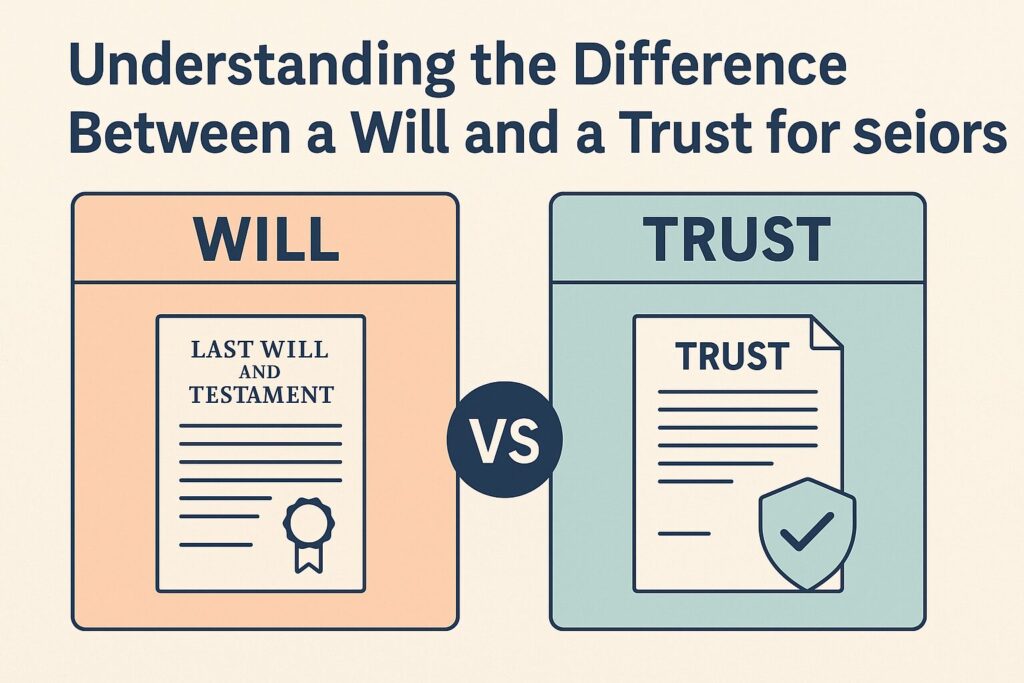Learn the key differences between a will and a trust for seniors. Understand how each works to protect your assets, ensure your wishes, and simplify estate planning
Understanding the Difference Between a Will and a Trust for Seniors: What You Need to Know
Planning for the future may feel overwhelming at any age, but for seniors, it becomes especially important. Whether you’re looking to protect your assets, ensure your wishes are honored, or make things easier for your loved ones, understanding the difference between a will and a trust for Seniors is a great place to start. Both are useful estate planning tools, but they serve different purposes and come with their own pros and cons.
If you’re asking yourself, “Do I need a will or a trust? Or both?” you’re not alone. Let’s walk through the basics in a way that makes sense, especially for seniors and retirees who want peace of mind about what happens after they’re gone.
What Is a Will?
A will, also known as a “last will and testament,” is a legal document that outlines how your property and possessions will be distributed after your death. You can also name a legal guardian for any dependents or pets, and designate someone as your executor (the person who will carry out your wishes).
Key things a will can do:
- Name who gets your belongings (beneficiaries)
- Appoint a guardian for minor children or dependent adults
- Name an executor to manage your estate
- Provide funeral and burial instructions
When it takes effect: A will only becomes active after you pass away and goes through a legal process called probate.
What Is a Trust?
A trust is another legal tool, but unlike a will, it becomes effective as soon as you create and fund it. A trust lets a third party (called a trustee) hold and manage your assets for the benefit of your beneficiaries.
There are many types of trusts, but for estate planning, the most common one is a revocable living trust.
Key things a trust can do:
- Bypass probate, speeding up the transfer of assets
- Keep your affairs private (no public court record)
- Provide more control over how and when your assets are distributed
- Protect your estate if you become mentally or physically incapacitated
When it takes effect: A trust takes effect immediately once it’s created and funded, not just after death.
Main Differences Between a Will and a Trust
Let’s compare the key differences between a will and a trust in a way that’s easy to understand:
| Feature | Will | Trust |
|---|---|---|
| Effective When | After death | Immediately upon creation |
| Requires Probate | Yes | No |
| Privacy | Public record | Private |
| Can Manage Incapacity | No | Yes |
| Controls Asset Timing | No (lump-sum) | Yes (schedule payouts) |
| Cost to Set Up | Lower upfront cost | Higher upfront cost |
As you can see, trusts tend to offer more flexibility and privacy, while wills are simpler and less expensive to create.
Should Seniors Choose a Will, a Trust, or Both?
This depends on your situation. For many seniors, a will alone is sufficient, especially if your estate is small or uncomplicated. But if you want to avoid probate, have multiple properties, or need to plan for potential incapacity, a trust might be the better option.
Here are some common senior scenarios:
You may want a will if:
- You don’t own much property
- You’re mostly passing down personal belongings
- You’re okay with the probate process
- You want a simple, cost-effective plan
You may want a trust if:
- You own real estate in multiple states
- You want to keep your estate private
- You worry about becoming incapacitated
- You want to leave money gradually over time to a loved one (e.g., monthly payments)
In some cases, seniors may benefit from having both a will and a trust. The will can serve as a backup (often called a “pour-over” will) that ensures any assets not already placed in your trust are added to it upon your death.
Costs and Time Considerations
Many seniors worry about the cost of estate planning. Generally speaking:
- A basic will can cost $150 to $500 if prepared professionally, or less if you use a reputable online service.
- A revocable living trust can cost $1,000 to $3,000 depending on complexity.
While a trust costs more upfront, it can save your family thousands of dollars in probate fees and court costs later. It can also speed up the process and reduce stress on your loved ones.
Also, don’t forget the time it takes for assets to be passed on. A will can take several months to over a year to move through probate, while a trust can allow for much faster distribution.
Planning for Incapacity
For many seniors, one of the biggest concerns isn’t just death—it’s what happens if you become unable to manage your own affairs due to illness, dementia, or injury.
A will doesn’t help in this case. But a living trust, paired with a durable power of attorney and healthcare directive, can ensure that someone you trust is legally able to make decisions for you.
Common Misconceptions
Let’s clear up a few myths seniors often hear about wills and trusts:
“I’m not wealthy, so I don’t need a trust.”
False. Trusts can be helpful even for modest estates, especially to avoid probate.
“A will avoids court.”
False. Wills go through probate unless all your assets are held in joint ownership or beneficiary accounts.
“Once I write a will, I’m done.”
Not quite. You should review your documents every 3–5 years, or after major life changes like a move, marriage, or the death of a loved one.
“I can just tell my kids what I want.”
Unfortunately, verbal promises don’t hold up legally. Put it in writing.
Final Thoughts: Peace of Mind Comes from Preparation
As a senior, creating an estate plan is one of the most caring things you can do for your family. By taking the time to understand the difference between a will and a trust—and choosing the tools that fit your needs—you help ensure your wishes are honored and your loved ones are protected.
Start by listing your assets, thinking about who you want to inherit them, and what kind of control or privacy matters most to you. Then, talk to a trusted estate planning attorney or professional.
It doesn’t have to be overwhelming. Taking one step at a time can lead to lasting peace of mind—for both you and your family.
More Resources:
Read: Estate Planning Basics for Seniors
Download: Free Estate Planning Checklist
Tool: Senior Will & Trust Selector Tool
For more helpful content tailored to your retirement years, keep exploring 60AndOver.net.





